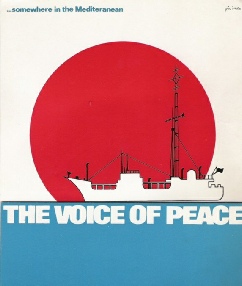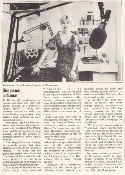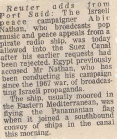© 2014-


Voice of Peace - History (4)
1976
Throughout the months after the aborted Suez Canal trip the Voice of Peace continued to broadcast from off the coast of Israel, although never actually announcing its precise location, just "somewhere in the Mediterranean".
During the summer of 1976 the station revamped its format andbegan playing an all-
The amount of advertising carried on the Voice of Peace also increased as a direct result of the format change -
So much commercial airtime was being booked by Israeli (and in particular Tel Aviv based) companies at this time that a planned peace mission voyage by the MV Peace to the Lebanese port of Beirut was abandoned -
In defence of this situation and, perhaps slightly embarrassed by the commercial success of the Voice of Peace, Abie Nathan declared that large donations from the substantial advertising revenue would be made to deserving causes. After meeting running expenses for the station profits from advertising income were then used to support charities and organisations involved in work of a humanitarian nature as well as for victims of war.
The station was hugely popular with listeners and the Voice of Peace came top in a public opinion poll organised by the state radio network, Kol Israel, in late 1976, receiving over 40% of listeners votes. In response the state network introduced its own pop music based service -
A London based company, Broadcast Placement Services (BPS), was appointed as British advertising representative for the Voice of Peace in July 1976. In addition to trying to sell airtime to large international advertisers BPS also recruited DJs for the Voice of Peace and made jingle packages for the station. Early advertising successes included campaigns fo r Leyland cars, Fiat cars, Revlon and Max Factor cosmetics.
r Leyland cars, Fiat cars, Revlon and Max Factor cosmetics.
With the enormous success of the Voice of Peace plans were formulated in the autumn of 1976 for the launch of an offshore television station from the MV Peace. These were later abandoned, however, for fear that the Israeli Government would take action to close both the radio and television services.
Just as the Voice of Peace appeared to be enjoying commercial and programming success things began to change in late October 1976. Many advertising contracts, mostly from Israeli based companies, were either cancelled or simply not renewed. This development, coming as it did in a period of success and popularity for the station remained a mystery to DJs and listeners alike for over two months.
Towards the end of December 1976, however, the reason became clear to all. The MV Peace had entered Haifa on 5th December where she was refuelled and restocked with supplies. She sailed from port two weeks later, heading southwards towards Egypt because Abie Nathan had at last been given permission to sail the M V Peace down the Suez Canal.
He had been in discussion with the authorities in Egypt for some time to secure their permission and one condition of this had been that to demonstrate its impartiality to all sides the station should not continue to carry a high volume of Israeli advertising. Permission was only finally received once Abie Nathan had agreed to this condition and been able to prove that the MV Peace was not an Israeli vessel, but was in fact registered in Panama. A further stipulation imposed by the Egyptian authorities was that the Voice of Peace did not transmit during the voyage.
Flying the Panamanian flag MV Peace arrived off Port Said on 31st December 1976 and was immediately put under guard by the Egyptian Navy. In the early hours of the following morning, January 1st 1977 the Peace ship was escorted as part of a convoy to the mouth of the Suez Canal.
1977
The MV Peace sailed along the Canal on 2nd/3rd January 1977 arriving at the Red Sea port of Eilat on the 4th to be greeted by local residents and the Mayor of the town. From here it was planned to sail the Peace to Aqaba in Jordan before returning through the Suez Canal to the Mediterranean, and the Mayor of Eilat gave Abie Nathan a gift to present to his opposite number in the Jordanian city. Unfortunately the Jordanian authorities later refused to allow the Peace ship to enter Aqaba to present the gift.
Meanwhile, in Egypt the news media largely ignored the voyage by the Peace ship and the authorities also prevented Abie Nathan distributing toys and sweets to Egyptian children. After being unable to complete large parts of his mission Abie Nathan sailed the Peace back through the Suez Canal, arriving in the Mediterranean and recommencing broadcasts from the Voice of Peace on 10th January 1977.
A survey conducted in August 1977 claimed that the Voice of Peace had an estimated audience of 23 million -
However, despite these figures a similar and probably more accurate survey in Israel revealed that the Voice of Peace was only the third most popular station, behind the state pop music service of Reshet Gimel and the Army station, Galei Zahal..


Click on picture to enlarge
History
Key Dates
Ship and Location
Technical
Staff
Programmes






Treasure Chest


Campaign
20th August 1976

The Guardian
3rd January 1977

Back to Voice of Peace

Back to Israel Gallery

